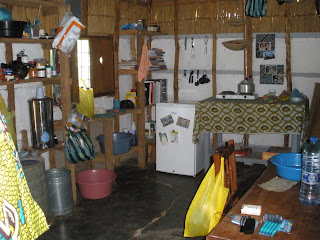I went home for the month of December hoping to feel refreshed and rejuvenated for my second year as a Peace Corps volunteer. The eve of my departure I felt dread. I didn’t want to go back! I had been reminded of how easy life could be. I want a coffee? There are 3 Starbucks on the same block. I need some cereal? An entire aisle is dedicated to it in Safeway. The aisle is next to the Safeway Starbucks. I could drink a latte while I picked out my cereal. I had forgotten how it felt to have so many choices! I blended into crowds. I could walk down the street and no one would give me a second glance. That may sound like an odd thing to miss, but when you stick out like a sore thumb everywhere you go for 14 months a little anonymity is nice for a change.
After finally arriving in Mozambique, however, it felt like I had never left. Just like my transition home, which I had worried about, my return to Moz felt natural. Mozambique is surely where I’m meant to be. My smooth shift back into life in Africa came as a huge comfort. I had a few obstacles to deal with…my house being broken into with a huge hole in the wall, being pick-pocketed and my electricity being turned off, for example…but after living the easy life for 5 weeks in Oregon, those problems seemed justified. Everything is back to normal and I’m happy to be back.
Almost immediately after getting back to Mozambique, I returned to Maputo for our mid-service conference. All of the volunteers from my group, Moz13, came to Maputo for medical work and some further training. I got to see volunteers that I hadn’t seen since we left training. Some people had just returned from visiting home, like myself, and others spent December traveling Africa. It was great to catch up with people.
We had a session led by Todd Chapman, Mozambique’s charge d’affairs officer. As always, his talk was an inspiration to us. He said that Peace Corps volunteers are the best ambassadors and reminded us of just how important our work is. It’s very easy to lose sight of our “big picture” goals while we live our day-to-day lives. Todd also had some information about the recent presidential election that took place in Mozambique. Frelimo, as predicted, won again. Armando Emilio Guebuza is still the president of Mozambique. Frelimo’s victory is thought to be questionable and, as such, the United States Government no longer recognizes Mozambique as an electoral democracy. That has created some tension between the Mozambican government and the U.S. America states that they are simply promoting a “competition of ideas.” During the election, the Minister of Education got promoted to Prime Minister. There has always been heavy teacher involvement in the political process, but it’s increasing. Other volunteers shared stories that their colleagues are being transferred or losing their jobs if they didn’t participate enough in the October election. Chapman said, “The opposition’s voice is like a pressure valve. You must open it so they can let off steam. If not, it’ll explode.” I thought this was a good analogy, especially with things occurring in United States politics at the moment. It’s an incredibly interesting political time in Mozambique. If anyone is interested in having some more information on the political situation in Mozambique, I know there have been articles in the NY Times you can search for. Check freedomhouse.org, too.
I’m teaching 8th and 9th grade this year. I have 6 classes: 2 of eighth grade, 4 of ninth. I have many of my students from last year and that makes me really happy. My average class size is about 80 students and it’ll only get larger. The first trimester is pretty informal because students are still petitioning to be enrolled in the school year. Things don’t get serious until the second trimester, which begins in April. I have classes in the afternoon so I get to spend time with teachers that I didn’t have an opportunity to get to know last year because I taught in the morning. So this year is full of changes! It’s already going by quickly.
On the home front: nothing too exciting! A few rats tried to move into my house the other night but I promptly poisoned them, haha. I’m going to try, yet again, to get a cat that will keep the rats at bay! It’s REALLY hot here. January and February are the hottest months in Moz. Last weekend I had my first beach trip since returning and it was great! I got a sunburn that redefines the color red, but it’s healing nicely J.
As always, I hope everyone is doing well and I miss you all!




























